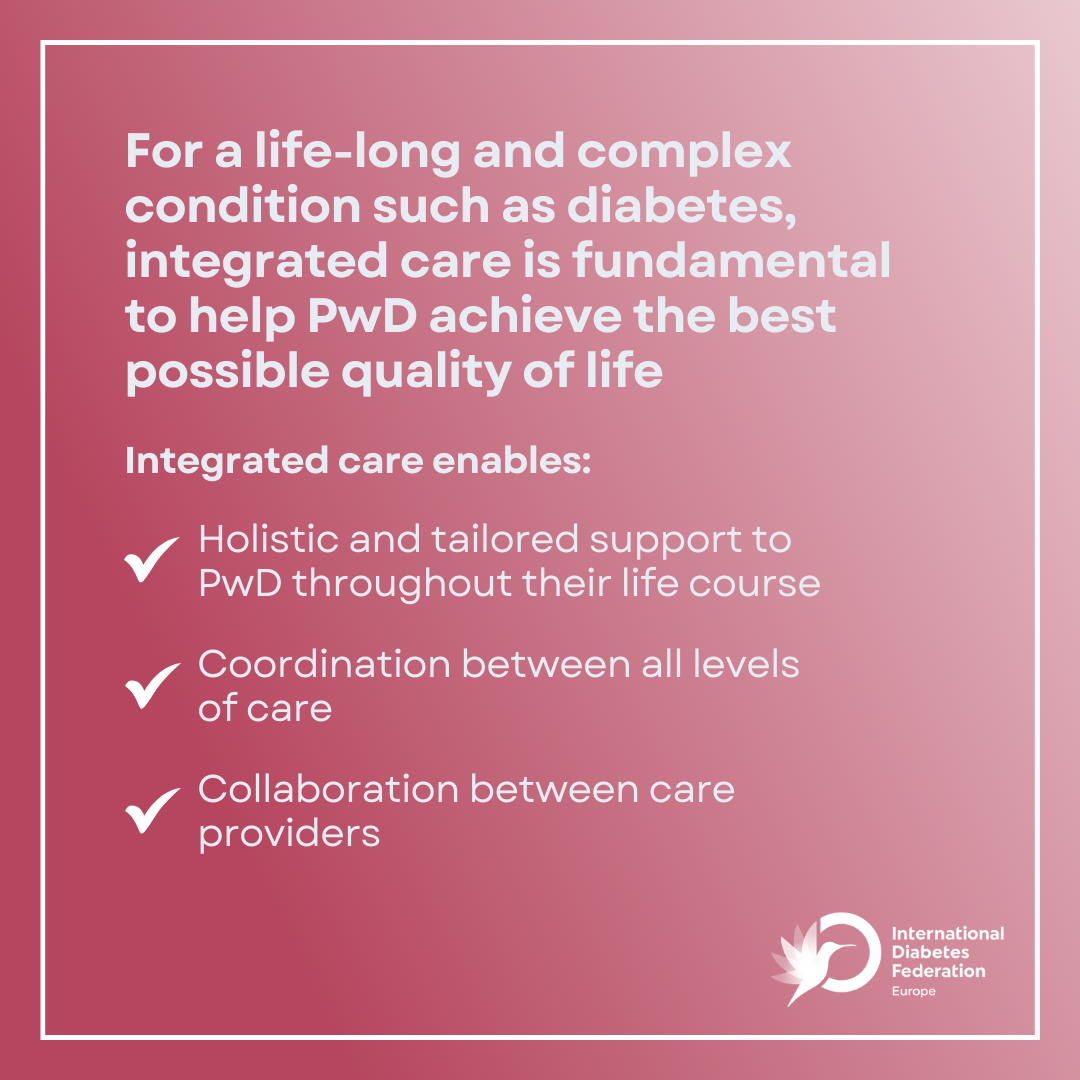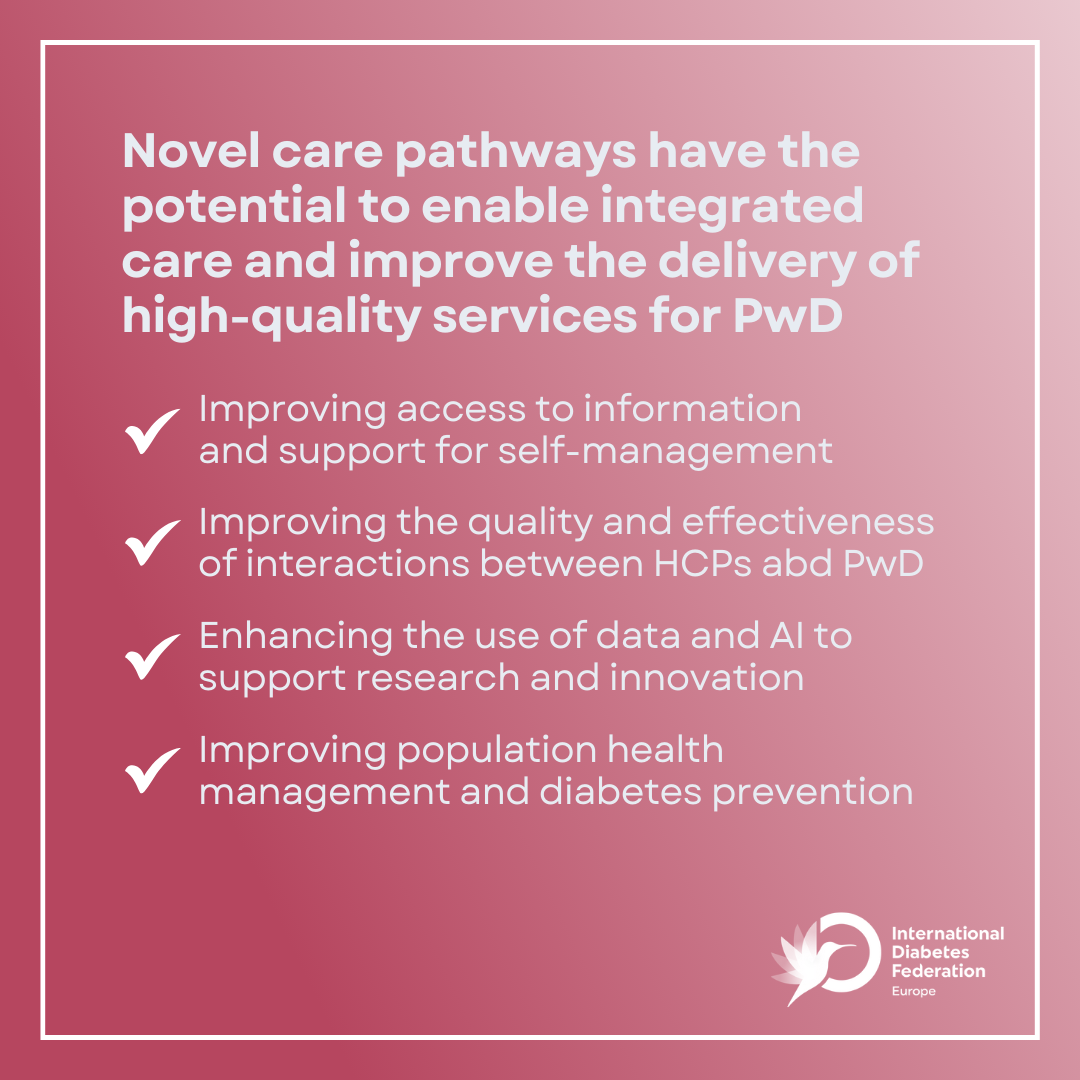Integrating care by placing PwD and their needs at the centre of their own care
According to the WHO Regional Office for Europe’s definition, integrated care entails the comprehensive delivery of quality services across the life-course, designed according to the multidimensional needs of the population and the individual and delivered by a coordinated multidisciplinary team of providers working across settings and levels of care. For a life-long and complex condition such as diabetes, integrated care is fundamental to help PwD achieve optimal health outcomes and the best possible quality of life.
Integrated care facilitates the collaboration between the wide range of care providers that are involved in the prevention, management and treatment of diabetes across all levels of care. With diabetes being the root cause of many other NCDs and complications, the integration of care is crucial for PwD who often live with, or are at risk of, developing more than one condition. This requires coordination between specialties and health services through the deployment of multidisciplinary teams and well-defined care pathways. General practitioners, endocrinologists, diabetes specialist nurses, diabetes educators, dietitians, psychologists and other specialists such as cardiologists, ophthalmologists, nephrologists and podiatrists, all play a role in diabetes care, from prevention to timely interventions that can support optimal diabetes management and prevent the development of diabetes-related complications.
The delivery of integrated care requires placing PwD at the centre of their care and understanding their needs and preferences to be able to support them in achieving optimal health outcomes. Diabetes is a life-long condition. This means that the type of support, services and resources that PwD need to manage their condition may evolve throughout their life course, from paediatric through to adult and geriatric care. Integrated and person-centred care establish personal care pathways for each PwD which are able to recognise and adapt to their changing needs and support the transition between different providers and levels of care by offering holistic and tailored support throughout their life course.
Enabling integrated care through person-centred and novel care pathways
Novel care pathways, supported by the adoption of novel technologies, protocols and the digitalisation of healthcare systems, have the potential to improve the delivery of high-quality services that enhance PwD’s quality of life by addressing barriers such as low PwD empowerment, shortages of healthcare professionals (HCPs), siloed and single-disease treatment approaches and lack of digitalisation, interoperability and IT integration.
Innovations such as telemedicine, web portals, apps, digital education services and digital therapeutics can support better care delivery in many ways while also leveraging data and the use of AI to support the deployment of more integrated and personalised care.
They can facilitate access to knowledge and information which is crucial for PwD who need to self-manage their condition 24/7 with limited input from HCPs, thereby empowering and supporting them in taking informed decisions. The need for sustained support for PwD can also be addressed by digital health models which integrate access to peer support groups. Remote monitoring/connections via digital platforms/tools, potentially removing the need for some face-to-face touch points while maintaining or increasing the frequency of contact, can also improve the quality and the effectiveness of interactions between HCPs and PwD, and subsequently free up human and financial resources for healthcare systems.
Finally, the enhanced use of big data analytics and AI can support research and innovation as well as the evaluation of healthcare interventions and the improved planning of resources while also helping to achieve better population health management and diabetes prevention. For example, population-level data can be used to identify people at high risk of developing diabetes and ensure that they receive timely and personalised care. At an individual level, improved prediction models can also support the improved prevention and management of diabetes-related complications.
In the lead up to World Diabetes Day, let’s raise awareness of the need to accelerate action towards the full adoption of integrated and novel care pathways to ensure that all PwD can achieve optimal health outcomes and the best possible quality of life. Together, United, Let’s Act on Diabetes.

